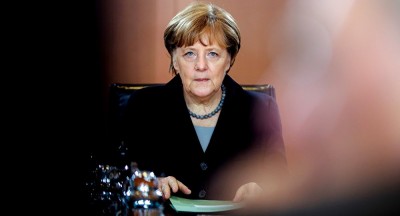Merkel’s Chasing a Failed Dream by Fantasizing About Bombing Syria

Note to readers: please click the share buttons above. Forward this article to your email lists. Crosspost on your blog site, internet forums. etc.
Merkel is desperate to keep alive her failed dream that Germany is the world’s foremost “normative power” during the Trump Era, and she doesn’t want the Mainstream Media to portray its British and French rivals as having usurped her country’s spot if Berlin once again declines to join the American-led coalition in bombing Syria under a possible false flag pretext.
All of Europe seems to be talking about the German government’s surprise announcement that it’s considering bombing Syria if the US claims that President Assad used chemical weapons during any upcoming liberation campaign in Idlib, though this shouldn’t be all that unexpected if one really thinks about it. The last time that the American-led coalition did this less than half a year ago, Germany sat out on the operation while the UK and France were able to present themselves through their manipulative control of the Western Mainstream Media as being “normative powers” that will “respond against rogue dictators who use chemical weapons”. This alternative reality means nothing in the real world but is very important to the competing European elite, especially those in the UK and France who want to craft the perception that post-election Germany’s tricky coalition politics have hamstrung it from ever exerting the same type of leadership over Europe as before.
Merkel, as one of the world’s chief Liberal-Globalist ideologues, is disproportionately influenced by this type of “peer pressure” because she’s literally devoted her entire life to making Germany the continental hegemon without it ever having to fire a shot against its neighbors like during its two previous attempts to take over Europe. She and her ilk have convinced themselves that their country is able to indefinitely protect its privileged international position not just through its dominance of EU institutions (and especially its common currency and free trade area), but also by presenting itself as the champion of “international norms”. This has taken on an unprecedented importance in Merkel’s mind ever since the election of President Trump, whose supporters see as a chaotic system-shaking “Kraken” dedicated to changing the previous order. With Liberal-Globalism under threat by none other than the US, Germany took it upon itself to replace the role that Obama’s America used to play.
This is a lost cause, however, because the world has irreversibly changed in the little more than 18 months since Trump entered office, and Germany also doesn’t have anywhere near the military capabilities – let alone political will – to follow in the US’ footsteps. That’s why it sat out during this April’s bombing run against Syria because it also misjudged just how much the Mainstream Media would present this action as “upholding international norms”. Having “learned her lesson”, or so she thinks, Merkel now seems to have decided that it’s better for her country to participate in any possible multilateral attack in response to the US’ false flag accusations, not wanting to lose out to the UK and France who are eager to replace some of Germany’s “lost” “normative power”. Again, it can’t be emphasized enough just how disconnected all of this is from real life, though it’s nevertheless how the European elite perceives of International Relations.
Merkel’s failed dream, which was dead from the get-go but nevertheless remained alive in her mind, is to replace Obama’s America as the world’s chief “normative power”, though she totally miscalculated the control that the US still wields over the Mainstream Media narrative that she believes is so important to “legitimizing” Germany’s control over the EU. She backed herself into a corner entirely of her own making and is therefore being manipulated by the structural constraints of the scenario that she imagined, reacting in the manner that she believes is best for advancing Berlin’s interests even though the only effect that any possible bombing of Syria might have for Germany is to cripple its rapprochement with Russia. Instead of coming off as a “leader”, Germany therefore looks more and more like it’s following the US, the UK, and France, which counterproductively proves the same narrative of weakness that Merkel is trying so hard to deny.
*
This article was originally published on Geopolitica.RU.
Andrew Korybko is an American Moscow-based political analyst specializing in the relationship between the US strategy in Afro-Eurasia, China’s One Belt One Road global vision of New Silk Road connectivity, and Hybrid Warfare. He is a frequent contributor to Global Research.

